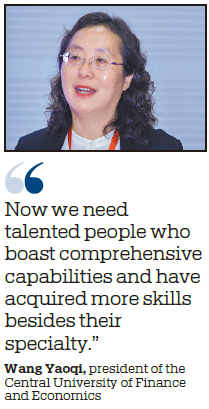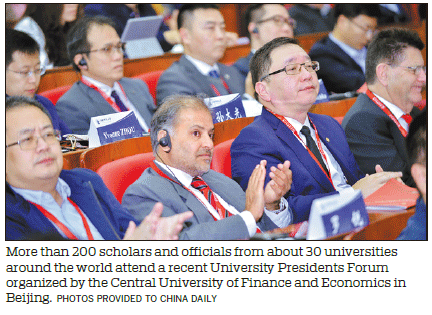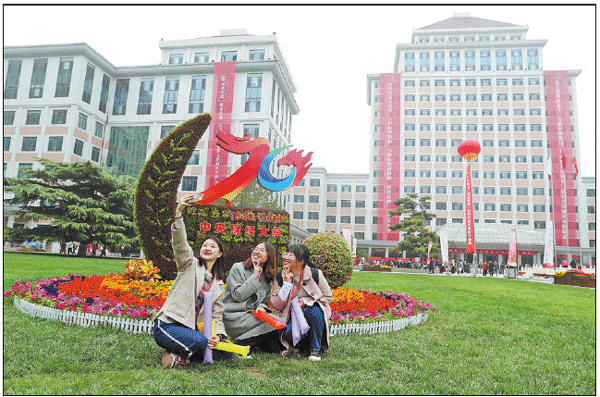Forum urges universities to evolve
Experts say increased technology means institutions need to adapt to a more comprehensive style, Chen Meiling reports.
The internet and new technology mean that universities have to evolve in disciplinary reform and teaching methods to confront opportunities and challenges, according to a recent forum held at the Central University of Finance and Economics in Beijing.
Higher education is the prime driving force for technological and innovative development, the major source for talent and an important element to evaluate the development and future potential of a country, said He Xiuchao, Party chief of the Central University of Finance and Economics, at the forum on Oct 18.
China's share in the global economy has increased many times over the past decades - from only 1.8 percent at the start of the reform and opening-up in 1978, to 15.2 percent today as China has become the world's second-largest economy.
Higher education played a major role in the process, according to He.


China had about 2,600 universities with more than 38.33 million students in 2018. The gross enrollment rate in higher education reached 48 percent, exceeding the average level of the key index of medium-high income countries, he says. The GER index measures the scale and quality of a country's higher education, and is also an indicator of its social development and progress.
Wang Yaoqi, president of the university, says as demand grows, the spreading of knowledge speeds up. This is fueled by big data and all-media networks, and the new technologies, especially those involved in internet, see a doubling in capacity every two years or so. This is not always easily comprehensible to every student and teacher.
In such cases, Wang says, the development mode of disciplines initiated by the university also undergoes dramatic changes from simple theoretical evolution to interdisciplinary study, teaching more practical approaches for students to better address and solve real-life problems. Meanwhile, current universities help students to obtain a greater understanding of humanity, morality and social benefit, according to Wang.
For example, economics may need to combine psychology, sociology, geography, and even biology and medicine. The reduction of poverty, for instance, involves knowing about medical care, resource allocation, as well as the study of costs, efficiency and management, she adds.
"Today's disciplinary development is more open and dynamic," says the CUFE president. "Previously, we trained people to enable them to specialize in a certain field, but now we need talented people who boast comprehensive capabilities and have acquired more skills besides their specialty."
Wang and He delivered speeches at the University Presidents Forum held by the CUFE, where more than 200 experts from about 30 universities worldwide shared their insights under the theme of "responsibility and mission for universities in social changes". The forum was one of the events marking the 70th anniversary of the university this year.
Zhuo Zhi, president of Southwestern University of Finance and Economics, who also attended the forum, agrees that Chinese higher education, especially in finance, should evolve to confront the uncertainties in the innovation-driven era.
The applications for internet and artificial intelligence have drastically changed the traditional finance sector, which propelled universities to rethink the knowledge system that higher institutions provided to their students, he says.
Besides, as China is carrying out projects related to the Belt and Road Initiative, and the development of Xiongan New Area, the Yangtze River Delta region and the Guangdong-Hong Kong-Macao Greater Bay Area, universities need to adapt to meeting the new demands for related human resources and professions, to better contribute to the development of the country and the world, Zhuo adds.
Lu Fucai, president of Jiangxi University of Finance and Economics, said at a session held under the main forum on Oct 18 that the market demand for finance talent has changed remarkably. "When AI replaces the basic function of accounting, can human accountants still find a job? When AI sees through the demands of customers in advance, what else can our marketing team do?
"During the age of AI, we need to think what occupations our students can take and what skills they should gain to help them to obtain a good job after graduation, so we need to timely upgrade our traditional management and finance sectors to satisfy the students' craving for new technological skills and advanced know-how."
Lu's university has opened a financial technology major to teach students to apply fintech in data security, anti-money-laundering and combating illegal capital flow. The university also introduces knowledge about big data for management and accounting majors, according to Lu.
Peter Dawkins, vice-chancellor of Victoria University in Australia, who attended the forum, says the university also conducted significant reform to cultivate talent for the 21st century. For instance, instead of opening the courses all together, the students now study one subject each time, focusing on it for four weeks before taking a new one. Each class has only 30 students, who have access to advanced online learning resources, Dawkins says.
The aim of the university is to boost one-on-one conversations between teachers and students, encourage students to be confident and independent and acquire the major skills needed in the modern era, such as problem-solving and entrepreneurship, he adds.
The CUFE was given the mission to train professionals in taxation when the People's Republic of China was founded in 1949. It's now known as "the cradle of financial talent" in the field of finance and management, with more than 140,000 graduates serving the country's finance system and other sectors. Applied economics and accounting are its national-level key disciplines.
Contact the writer at chenmeiling@chinadaily.com.cn

|
Students take selfies on the decorated campus of the Central University of Finance and Economics as it celebrates the 70th anniversary of its founding in Beijing. Wang Jing / China Daily |
(China Daily Global 10/30/2019 page14)



















